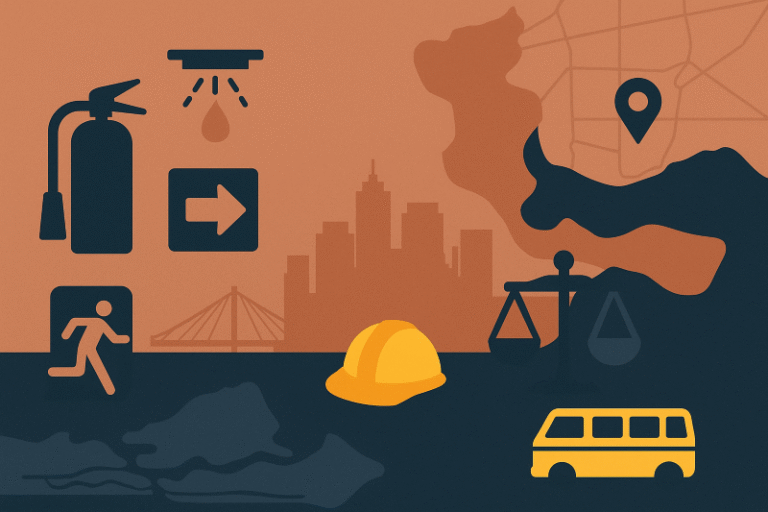The Afriland Towers/UBA fire on Lagos’ Broad Street that affected FIRS (Federal Inland Revenue Services) and other offices surfaced emerging issues in occupiers’ liability to visitors, customers, and users.
Introduction
Although the tragic fire incident left Nigerians mourning casualties, it questions occupiers’ liabilities and workplace safety. While UBA’s official statement focused on reassurances, the incident highlights pressing questions of employers and property manager’s liabilities to users, customers, and visitors.
What duties do property owners, managers, and their tenants owe to customers, and visitors under Nigerian law? And what gaps exist in compliance, and crisis communication?
Corporate communications is a crisis response but Nigeria’s Occupiers’ Liability Act and the Lagos State Torts Law, together with the common law principles define the responsibilities of occupiers and landlords in preventing harm to lawful visitors.
We cross-examined UBA’s official statement on the Afriland Towers’ fire here
This commentary examines old yet new issues of occupiers’ liabilities of Afriland, UBA, FIRS, UAC and others through the broad lens of occupiers’ liabilities. We aim to evaluate workplace safety in a succeeding article.
Legal Framework for Occupiers’ Liability in Nigeria
Nigeria’s Occupiers’ Liability Act imposes a statutory duty of care on occupiers. Occupiers are those who in one way or the other are in control of their premises and include owners of business premises.
Who must ensure that lawful visitors are reasonably safe when using their facilities and properties. Occupiers’ duty extends to customers, vendors, visitors, and users.
The Lagos State Torts Law covers negligence, compensation for injury, and duties owed by landlords and tenants. The Tors Law together with the Occupiers’ Liability Act require both Afriland Properties (as the property owner/manager) and tenant-occupiers such as UBA, FIRS, and others may face responsibility for lapses in fire safety, evacuation procedures, and building maintenance.
Ownership is not the key element in deciding who is an occupier under the Nigerian law. The legislative lens focused on control, safety, and proactive risk management.
Emerging Issues from the Afriland/UBA Fire
- Fire Safety Compliance
Initial reports suggest the fire began in the inverter room at the Afriland Towers. This surfaced the questions of whether smoke extractors, alarms, and sprinklers functioned as designed. Or they were never installed against Lagos State Fire Safety Regulations and global best practices.
Failure to maintain fire safety systems and standards amount to negligent treatment of visitors, users, customers, and other lawful third parties.
- Emergency Preparedness
Videos from the scene show chaotic evacuations and reports of blocked or smoke-filled exits.
The duty under law is not just to provide exits but to ensure drills, signage, and staff readiness. Lack of regular fire drills may constitute a failure to exercise reasonable care.
- Shared Responsibility
Occupiers’ liability does not rest with Afriland Towers or their tenants alone. Building managers must maintain common safety infrastructure, while tenants must train staff and ensure their offices comply with existing standards.
In Afriland Towers, both Afriland Properties and tenants like UBA share exposure.
- Liability to Third Parties
Occupiers’ liabilities to third parties extend to customers, vendors, and other lawful visitors. If a bank customer, courier, or vendor was injured, they may have actionable claims.
Nigerian courts have repeatedly affirmed that liability is not confined to employees.
- Transparency and Crisis Response
Global best practice requires openness: acknowledging what is known, what is under investigation, and what support is being provided to victims.
Although UBA’s statement clarified the scope of the fire, UBA failed to address compensation, psychological support, or safety compliance audits.
Under Nigerian law, lack of transparency may not itself be actionable, but it amplifies reputational and regulatory risks.
Comparative Insights
Contrarily, the UK’s Occupiers’ Liability Acts distinguish duties to lawful visitors and even trespassers, stressing foreseeability and reasonableness.
Similarly, in the US, premises liability regimes impose strict duties on landlords and employers for safe evacuation routes and functional fire equipment.
South Africa’s OHS (.) framework requires not only compliance but demonstrable training and drills.
Against these benchmarks, Nigeria’s statutory framework is robust on paper but weak in enforcement.
The Afriland/UBA fire shows the urgent need for Nigerian corporates to embrace global norms of disclosure, independent investigations, and immediate victim support.
Key Legal and Compliance Takeaways
- Statutory Duty of Care: Under the Federal Occupiers’ Liability Act, occupiers must keep lawful visitors safe. Breach invites civil liability.
- Localized Negligence Liability: The Lagos State Torts Law gives victims direct grounds to claim damages for injury or death caused by unsafe premises.
- Dual Responsibility: Landlords must maintain common systems (fire alarms, smoke extractors, evacuation routes), while tenants must ensure internal safety measures and staff readiness.
- Documentation Matters: Maintenance logs, safety certificates, and fire drill records are critical. In litigation, absence of such records often proves negligence.
- Beyond Legal Liability: Corporate entities that ignore mental health, victim compensation, or transparent engagement with regulators risk reputational collapse.
Conclusion
The Afriland Towers/UBA fire is more than a tragedy; it is a compliance wake-up call. Nigerian landlords, tenants, and service providers must recognise that liability under the Occupiers’ Liability Act and Lagos State Torts Law is real, enforceable, and preventable through diligent compliance.
Occupiers’ liability is not mere box-ticking or paperwork. It is about protecting human life, preserving dignity, and building trust.
Nigerian businesses must now move beyond defensive statements to proactive compliance, transparent disclosures, and global-standard crisis management.
media pack:


